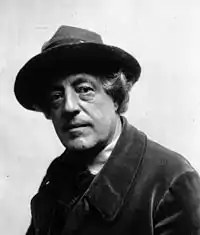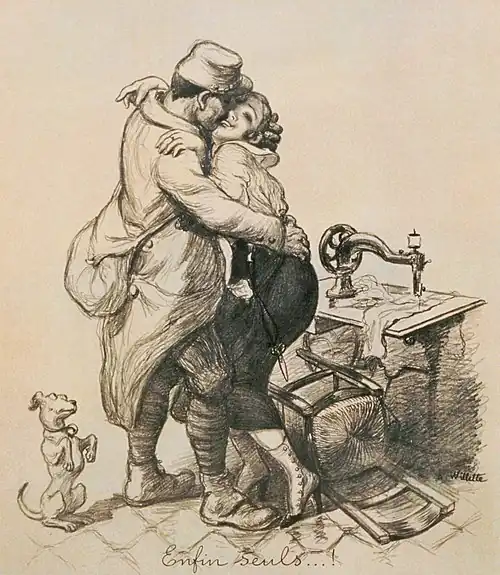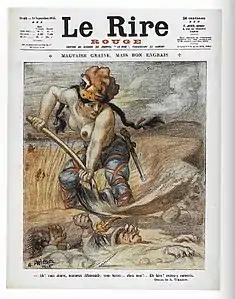
Adolphe Léon Willette (30 July 1857, Châlons-sur-Marne – 4 February 1926, Paris) was a French painter, illustrator, caricaturist, and lithographer, as well as an architect of the famous Moulin Rouge cabaret. Willette ran as an "anti-semitic" candidate in the 9th arrondissement of Paris for the September 1889 legislative elections.
Biography
Willette studied for four years at the École des Beaux-Arts under Alexandre Cabanel. His graphical work ranged from dainty triviality or political satire: he made Pierrot an imaginary hero of France, and established Mimi Pinson as frail, lovable, and essentially good-hearted. He could also be bitter and fierce, a partisan of political ideas. The guillotine and the figure of Death appear in his caricatures.[1] At the time of the Dreyfus affair he was an anti-dreyfusard;[2] with Jean-Louis Forain, he moved to the political right.[3]
Works
The artist was a prolific contributor to the French illustrated press under the pseudonyms "Cémoi", "Pierrot", "Louison", "Bébé", and "Nox", but more often under his own name. He illustrated Melandri's Les Pierrots and Les Giboulles d'avril, Le Courrier français, and published his own Pauvre Pierrot and other works, in which he tells his stories in scenes in the manner of Busch. He decorated several "brasseries artistiques" with wall-paintings, stained glass, and so on notably Le Chat noir and La Palette d'or, and he painted the ceiling for La Cigale music hall. Willette contributed to the Salon des Cent and six of his posters were published in Les Maîtres de l'Affiche. A collection of his works was exhibited in 1888. His V'almy is in the Luxembourg, Paris.[1]
Willette's characteristically fantastic Parce Domine was commissioned by Rodolphe Salis for Le Chat Noir in Montmartre. It was shown in the Franco-British Exhibition in 1908.[1][4]
Selected works
 Journée du Poilu.
Journée du Poilu.
25 et 26 décembre 1915 Anti-Semitic Election poster
Anti-Semitic Election poster
for Willette.jpg.webp) Cacao Van Houten
Cacao Van Houten "Diploma" for a loyal subscriber to Le Courrier Français
"Diploma" for a loyal subscriber to Le Courrier Français Cover of Le Rire Rouge. #43
Cover of Le Rire Rouge. #43 Poster for Le Courrier Français
Poster for Le Courrier Français.jpg.webp) Exposition of works by Willete
Exposition of works by Willete
References
- 1 2 3 One or more of the preceding sentences incorporates text from a publication now in the public domain: Chisholm, Hugh, ed. (1911). "Willette, Leon Adolphe". Encyclopædia Britannica. Vol. 28 (11th ed.). Cambridge University Press. p. 650.
- ↑ Schwartz, Vanessa R.; Przyblyski, Jeannene M. (2004). The Nineteenth-century Visual Culture Reader. Psychology Press. p. 336. ISBN 978-0-415-30865-6.
- ↑ Leighten, Patricia (8 November 2013). The Liberation of Painting: Modernism and Anarchism in Avant-Guerre Paris. University of Chicago Press. p. 28. ISBN 978-0-226-00242-2.
- ↑ Hewitt, Nicholas (2017). Montmartre: A Cultural History. Oxford University Press. p. 40. ISBN 978-1-78694-023-0.